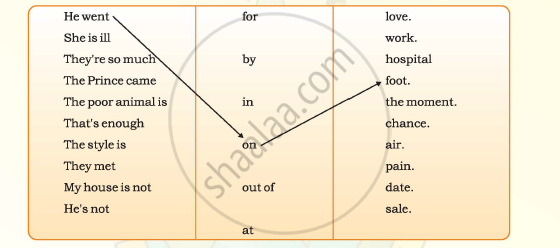Advertisements
Advertisements
प्रश्न
Look at the pictures of people talking to each other. With your partners, discuss what they are telling each other. Share your ideas with the class.
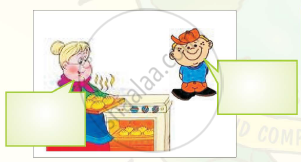
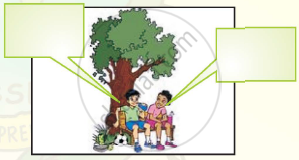
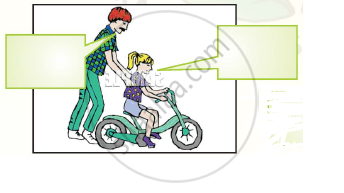
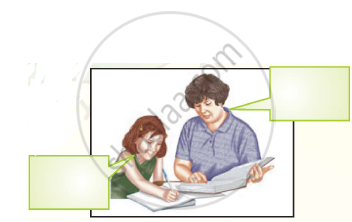
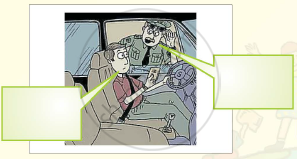
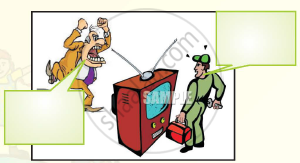
उत्तर
Merely guess work. Meant for discussion at class level. One version of the answer is given below :
1. (a), (b) The boy is smiling at seeing the hot eatables as he is hungry.
He asks his mother, “Mother, yummy, give me these at once”.
The mother says, “Wait, darling, let me put these on the table”.
2. (c), (d) The boy sitting to the left says, “Let me drink the water first”.
The boy looking at him says, “Leave some water for me. Don’t drink the whole of it”.
3. (e), (f) The man holding the little girl, “Look straight and balance yourself’.
The girl replies, “Yes dad, I am trying. See I am moving the cycle slowly”.
4. (g), (h) Mother tells her daughter, “Look here, darling. You have to draw the picture like this”.
Daughter says, ‘Yes, mom, I am trying to do like this”.
5. (i),(j) The policeman to the boy driver, “Hold, show me the driving licence”.
Boy driver (flustered), ‘Yes, yes sir, here it is”.
6. (k), (l) The TV mechanic (confused) says, “I have done my best to see the fault in your television…”.
The man (showing his anger) says, ‘You can’t go till you set my television in order”.
APPEARS IN
संबंधित प्रश्न
Answer the following question briefly.
Why did the grandmother depend on her granddaughter to know the story?
Rain in the hills and rain in the desert present entirely different scenario. In the
hills it revitalises the greenery and freshens the vegetation; it waters the parched
land and relieves the thirsty and panting souls in the desert.
(i) This has been a year of scanty rains. Imagine how the rain would be welcomed
when it pours in the hills and in the desert after a long dry spell. Choose one such
place and describe
(a) What are you likely to see?
(b) What would happen to the rain water?
(c) What would be the scene before and after the rain?
(ii) How would you express rain as
Answer the following question briefly.
Who was Jeanette? What was the cause of her death?
Ganesh comes to visit Vikram and finds the house locked. He leaves a note. It is raining, the note gets wet and some words are washed off. Complete the note by filling in the missing words by choosing the correct option given below.
Dear Ram
I am so sorry to have missed you. I came to Udaipur on (a) _________ business trip and I have been here (b) _________ two weeks now. Your neighbours told me (c) _________ sad news that your father (d) _________ been hospitalized. I wish I (e) _________ see him but unfortunately I (f) _________ leaving for Madras today on (g) _________ 4 o’clock plane. Please send your father my best wishes. Anyway, I (h) _________ be in Udaipur again on 3rd and 4th June and I (i) _________ certainly find time to call on vou even though it (j) _________ some to be a hectic schedule.
Yours affectionately
Ganesh
| (a) (i) X (ii) the (iii) a (iv) an |
(b) (i) since (ii) from (iii) for (iv) in |
| (c) (i) the (ii) X (iii) an (iv) a |
(d) (i) is (ii) being (iii) has (iv) have |
| (e) (i) could (ii) have (iii) can (iv) having |
(f) (i) am (ii) been (iii) is (iv) being |
| (g) (i) a (ii) by (iii) the (iv) an |
(h) (i) am (ii) will (iii) are (iv) being |
| (i) (i) shall (ii) will (iii) ought to (iv) must |
(j) (i) would (ii) will (iii) shall (iv) is |
Look at the text below. The sentences have been jumbled up. Write them in order out to produce a complete paragraph. The first sentence has been given to help you.
(a) To conclude, like many things in life it is up to the individual to use TV wisely, or to abuse it and become its slave.
(b) By contrast, those who attack TV state that it makes people lazy by doing everything for them.
(c) Television is here to stay.
(d) In other words, it stifles rather than stimulates the imagination.
(e) Defenders of TV say that it is a wonderful source of information about things we can never hope to see or do in person.
(f) Moreover, they say it makes topics interesting which would otherwise be boring and difficult in books. .
(g) However, is it a boon or a curse?
(h) In fact, it has become an indispensable part of our lives.
(a) Television is here to stay. ____________________________________________________________________________________________________________________________________________________________________________________________________________________________________________________________________________________________________________________________________________________________________________________________________________________________________
(b) What helped you to put the sentence back in the correct order?
The Passive in Tentative Statements
The passive is often used in tentative statements where the writer tries to be as neutral as possible.
| considered | to | be… | ||
| It | is | said | ||
| known | to | have been… | ||
| They | are | acknowledged believed regarded as… |
8.1
Look at the box below. Write tentative statements following the pattern in the table above.
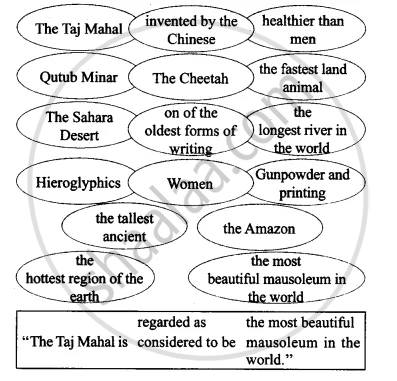
Imagine you are a famous person. Write a brief report (maximum 80 words) of a day in your life. Use the passive voice where you think it is appropriate. An example of how you might start is given below.
I woke up at 7 am and was given tea. It was a lovely cool morning so I decided to walk to the film studio. Normally I am driven____________________________________________________________________________________________________________________________________________________________________________________________________________________________________________________________________________________________________________________
SAID and TOLD
Be careful with the use of said and told. Look at these examples.
(a) He told me to stop work.
They told us they had four children.
She said (that) they were finished.
We said (that) we were leaving at 6 o’clock.
What would you use when ordering somebody to do something: told or said?
(b)
Fill in the blanks using said or told.
Add any other words that you think are necessary.
- He ________ to sit down and I did.
- She ________ the weather would be hot and it was.
- They ________ about the disaster and we listened carefully.
- He ________ to go away and they did.
- She ________ there was no other way to do it.
Group the prepositions in the box below to indicate their use as prepositions of place (P), movement (M) or time (T). There may be more than one category for each.
| between ________ along ________ since ________ up ________ among ________ in front of ________ after ________ |
past ________ on ________ behind ________ round ________ for ________ across ________ through ________ |
before ________ until ________ beside ________ out of ________ at ________ under ________ during ________ |
Common Combinations using Prepositions
Link the words from the different columns to produce meaningful sentences. One has been completed as an example. If you wish, write out the correct sentences in your notebook.
